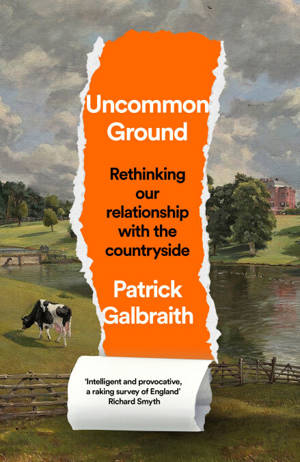
- Afhalen na 1 uur in een winkel met voorraad
- Gratis thuislevering in België vanaf € 30
- Ruim aanbod met 7 miljoen producten
- Afhalen na 1 uur in een winkel met voorraad
- Gratis thuislevering in België vanaf € 30
- Ruim aanbod met 7 miljoen producten
Zoeken
Uncommon Ground E-BOOK
Rethinking our relationship with the countryside
Patrick Galbraith
E-book | Engels
€ 27,20
+ 27 punten
Omschrijving
‘A curious-minded and subtle intervention in the politics of the countryside’
Sunday Times
'Galbraith spent three years investigating the truth about rural Britain and how we treat it. Uncommon Ground is the brilliant result' Daily Telegraph
'Very funny. Acutely observed. An attempt to look beyond the usual clichés of country life'
Observer
“Brilliant. This book is a sort of necessary clever trespass itself, on everyone’s notions about ‘our land’.”
Country Life
"Filled with voices from people who don’t always make the headlines in the UK land access debate."
Scotsman
The countryside is under increasing pressure and people, the science shows, need nature. Access to the countryside is essential for our health, our happiness and our future. But does nature need us?
In January 2023, the largest land access demonstration since the 1930s took place on a bright wintery morning on Dartmoor. The access movement demands that the countryside be thrown open. This, they argue, would help nature by giving the public the opportunity to hold farmers and wealthy landowners to account.
But would it really work for Britain’s growing population to spill out across the countryside, and is access quite as restricted as we are led to believe?
In Uncommon Ground, Patrick Galbraith takes us on an extraordinary tour of rural Britain, from the Hebrides to Devon, and from Anglo-Saxon England to the present day. To uncover the truth and fully understand our deep connection with the land, he meets farmers, Irish Travellers, politicians, salmon poachers, and the nation's most-hated landowners, as well as activists calling for a total abolition of the right to own land.
In his much-celebrated style, Galbraith works hard to listen to those who often don’t get listened to. This raking survey of our fast-changing country, reveals the essence of rural Britain's soul. Uncommon Ground argues that what matters is not greater access but how we engage with the land and demands that landowners give us more opportunities to do so, while also giving endangered wildlife the right to tranquility.
Sunday Times
'Galbraith spent three years investigating the truth about rural Britain and how we treat it. Uncommon Ground is the brilliant result' Daily Telegraph
'Very funny. Acutely observed. An attempt to look beyond the usual clichés of country life'
Observer
“Brilliant. This book is a sort of necessary clever trespass itself, on everyone’s notions about ‘our land’.”
Country Life
"Filled with voices from people who don’t always make the headlines in the UK land access debate."
Scotsman
The countryside is under increasing pressure and people, the science shows, need nature. Access to the countryside is essential for our health, our happiness and our future. But does nature need us?
In January 2023, the largest land access demonstration since the 1930s took place on a bright wintery morning on Dartmoor. The access movement demands that the countryside be thrown open. This, they argue, would help nature by giving the public the opportunity to hold farmers and wealthy landowners to account.
But would it really work for Britain’s growing population to spill out across the countryside, and is access quite as restricted as we are led to believe?
In Uncommon Ground, Patrick Galbraith takes us on an extraordinary tour of rural Britain, from the Hebrides to Devon, and from Anglo-Saxon England to the present day. To uncover the truth and fully understand our deep connection with the land, he meets farmers, Irish Travellers, politicians, salmon poachers, and the nation's most-hated landowners, as well as activists calling for a total abolition of the right to own land.
In his much-celebrated style, Galbraith works hard to listen to those who often don’t get listened to. This raking survey of our fast-changing country, reveals the essence of rural Britain's soul. Uncommon Ground argues that what matters is not greater access but how we engage with the land and demands that landowners give us more opportunities to do so, while also giving endangered wildlife the right to tranquility.
Specificaties
Betrokkenen
- Auteur(s):
- Uitgeverij:
Inhoud
- Aantal bladzijden:
- 368
- Taal:
- Engels
Eigenschappen
- Productcode (EAN):
- 9780008644420
- Verschijningsdatum:
- 23/04/2025
- Uitvoering:
- E-book
- Beveiligd met:
- Adobe DRM
- Formaat:
- ePub

Alleen bij Standaard Boekhandel
+ 27 punten op je klantenkaart van Standaard Boekhandel
Beoordelingen
We publiceren alleen reviews die voldoen aan de voorwaarden voor reviews. Bekijk onze voorwaarden voor reviews.








